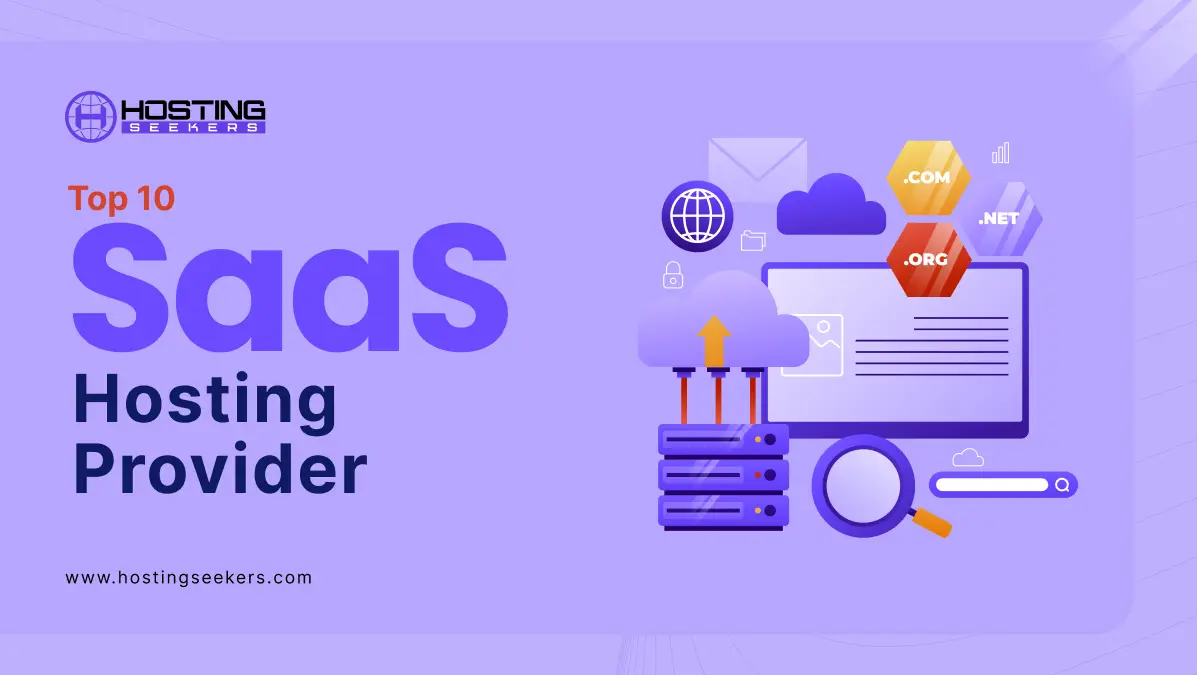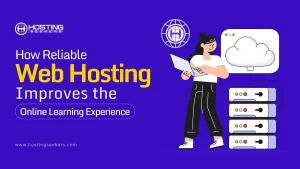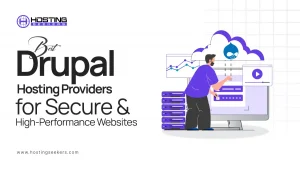
Top 10 SaaS Hosting Providers in 2026
Web Hosting Tips Updated on : January 28, 2026As more companies move away from traditional on-premises systems to flexible cloud-based options, having a dependable SaaS hosting provider becomes necessary to keep everything seamless and running in the background.
In this guide, you will find the Top 10 SaaS Hosting Providers in 2026, based on scalability, reliability, security, and the best value for the money. Whether you’re looking for a flexible pay-as-you-go plan, enterprise-grade compliance, or infrastructure friendly for developers, this list helps you make an informed decision to host your SaaS product seamlessly and sustainably.
What is SaaS Hosting?
SaaS hosting is a specialized web hosting solution built to deploy and manage a Software as a Service application. Unlike traditional hosting, where applications are installed on local servers or user machines, SaaS hosting delivers software applications over the internet using cloud infrastructure or dedicated data centers. These features allow users to access software on demand via a web browser without any local installation.
The main components of SaaS hosting consist of compute resources that can scale as you need them, storage that is reliable, networking, security protocols, and maintenance services to ensure your applications have high availability and performance under varying workloads.
SaaS hosting is offered in multi-tenant environments, meaning resources are securely shared among several users for efficiency. It often has a lot of features available, like automatic updates, backups, monitoring, and compliance certifications, which are important for business applications.
To make it easier to understand, consider these common examples of SaaS hosted applications you must be familiar with:
Streaming Movies on Netflix: You can watch movies and television shows without downloading them. Netflix uses SaaS hosted streaming to provide a seamless experience for millions of users all around the world simultaneously.
Using Google Workspace (Gmail, Docs): Instead of downloading the apps on your computer, you use an online version of the email and document apps hosted securely in Google’s cloud – making it easy for users to collaborate online, anytime, anywhere, on any device.
Top SaaS Hosting Providers & Plans
| Provider | Starting Price / Month | Key Features | Ideal For |
| Digital Ocean | $4/month for a basic Droplet (shared CPU) | Scalable cloud compute, predictable pricing, bandwidth included, managed services (databases, storage) | Developers, small to medium apps, and those who want straightforward cloud infrastructure |
| Leaseweb | Not specified | Global data centers, scalable IaaS options (cloud, bare metal, CDN), customizable infrastructure, and reliable network performance | SaaS providers needing global reach, high performance, and flexible infrastructure |
| Novoserve | $104.92/month (mid-range servers) |
Dedicated infrastructure, full-disk encryption, private networking, compliance with GDPR/HIPAA/SOC 2/CCPA, 24/7 support | SaaS companies require secure, compliant, and customizable hosting environments |
| AWS Amplify | Pay as you use | Integrated CI/CD, hosting, global distribution, backend services, no per-seat pricing | Web/mobile apps, frontends + serverless backends, teams wanting tight integration with the AWS ecosystem |
| Kamatera | $4/month | Reliable performance with 99.95% uptime, flexible monthly/hourly pricing, unlimited scaling, 24/7 expert support | SaaS companies require instant scalability and reliable performance to support usage peaks and growth |
| Cyfuture | Pay As You Go | scalable cloud infrastructure, high security with encryption and monitoring, 24×7 expert support | Businesses needing flexible pricing, secure SaaS deployment, and robust, scalable hosting with reliable support |
| Webdock | Starting from $2.50/month | Flat-fee VPS pricing with free control panel, automated backups, SSL certificates, custom resource scaling, EU data centers | Developers or small businesses seeking affordable, fully customizable VPS hosting with predictable costs |
| PhoenixNAP | Starting from $130/month | Bare Metal Cloud, private/hybrid cloud options, DDoS protection, global data centers, flexible billing, backup & recovery support | SaaS providers needing secure, high-performance infrastructure with flexible billing and global presence |
| IBM Cloud | Starting from $686/month | Fully managed messaging with automated setup and scaling, secure, encrypted delivery, built-in monitoring, and multi-cloud integration | Ideal for applications needing reliable messaging, secure integration, and scalable multi-cloud communication |
| HostingRaja | Not specified on the official site | HostingRaja offers high-performance SaaS hosting with secure data centers, 24/7 managed support, and user-friendly interfaces, making it ideal for businesses seeking reliable, managed hosting. | Businesses seeking reliable SaaS hosting solutions with robust performance and managed support. |
Top 10 SaaS Hosting Providers
1. DigitalOcean
DigitalOcean offers a complete catalog of cloud services tailored for SaaS applications. They offer scalable compute services like Droplets and Kubernetes, managed databases, object storage, and a PaaS through their app platform.
It provides a 99.99% uptime SLA, along with 17 data centers around the globe that you can use for your application to ensure availability. With its transparent pricing and developer-centered solutions, it is a good opportunity for startup companies and small to medium businesses that want cloud infrastructure solutions.
Price: Starts at $4/month for basic Droplets
Pros
- Transparent pricing with no hidden fees.
- It provides a 99.99% uptime SLA, with 17 data centers around the globe to provide high availability.
- Fully managed databases for MySQL, PostgreSQL, and MongoDB, which allow simplified database management.
- App Platform supports auto-scaling and comes with GitHub/GitLab integration and DDoS mitigation.
- Managed Kubernetes and functions for serverless applications.
Cons
- Limited control in the app platform compared to Droplets, which may not suit advanced users.
- App platforms may be more expensive for applications that are resource-intensive due to container-based pricing.
2. Leaseweb
Leaseweb provides IaaS, designed for SaaS hosting with many solutions like public and private cloud, bare metal servers, and content delivery networks. Their infrastructure is designed to support scalable, secure, and high-performance applications, with a global presence across multiple data centers. Leaseweb emphasizes flexibility and reliability to meet the broad needs of all SaaS companies.
Price: Pricing details are not specified on the official page.
Pros
- Global network of data centers for low-latency access.
- Comprehensive suite of hosting services, including cloud, bare metal, and CDN.
- A flexible infrastructure to provide the varying needs of a SaaS company.
Cons
- Pricing information is not available on the website.
- The platform may require technical expertise to fully leverage its capabilities.
3. Novoserve
It provides dedicated SaaS hosting solutions built for security, scalability, and compliance. Their infrastructure features full-disk encryption, private networking, customizable firewalls, and deep identity controls (RBAC, MFA). In addition to providing secure hosting, they support compliance with various regulations, including GDPR, HIPAA, SOC 2, and CCPA, ensuring data sovereignty and audit trails as part of their hosting services.
Price: Starts at $104.92/month
Pros:
- Customizable, dedicated infrastructure created for SaaS applications.
- Strong security features, including full-disk encryption and private networking.
- Ability to support compliance with major regulations (GDPR, HIPAA, SOC2, CCPA).
- Expert support 24/7, with average ticket response times of under 15 minutes.
Cons:
- Pricing could be higher than shared or cloud hosting options.
- Requires additional management and technical expertise compared to fully managed services.
4. AWS
AWS is a powerful cloud platform designed for SaaS applications, with scalable compute, storage, and managed services. Businesses can use AWS to build, deploy, and scale their SaaS applications in various programming languages and frameworks efficiently. With features such as auto-scaling and a global infrastructure, this system provides high availability and performance for your SaaS application, no matter the size.
Price: Pay-as-you-go pricing model
Pros:
- Comprehensive platform for building, hosting, and scaling SaaS applications.
- Supports multiple programming languages and application platforms.
- Provides high agility and operational efficiency for SaaS businesses.
- Can respond quickly to demand spikes.
Cons:
- Pricing for services can be complicated, due to multiple services and usage-based costs.
- To maximize cost and performance, some knowledge of AWS services is required.
5. Kamatera
Kamatera offers scalable cloud infrastructure for SaaS applications, and flexible monthly or hourly billing without a long-term contract. The platform allows you to scale your resources fast to fit the demands of your application, with a commitment to performance and a 99.95% uptime SLA.
Price: Starts at $4/month for basic VPS configurations.
Offers hourly billing for flexible cost management.
Pros:
- Worldwide data centers facilitate low-latency access.
- Flexible scaling allows instant resource adjustments to meet demand.
- 24/7 expert support available to help with infrastructure needs.
- Pre-configured applications are available via the marketplace for quick deployment.
Cons:
- Limited managed services compared to larger providers; may require more hands-on management
- No built-in SaaS-specific tools; users must integrate third-party solutions
6. Cyfuture
Cyfuture offers cloud-based Software-as-a-Service solutions for modern businesses, providing customers with secure, scalable, and economical service. Supports customers with manual servicing under certified Service Level Agreements (SLA) for high availability and performance.
Price: Pay-as-you-go pricing model
Pros
- Use advanced cloud infrastructure to ensure efficient SaaS applications operation, even during peak periods.
- Deploys best encryption methods, multi-dimensional security layering, and continuous monitoring software for application and data security.
- Provides 24/7 availability of expert support to assist customers in addressing and resolving issues as soon as possible.
- Continuously integrates the latest technological developments to keep SaaS applications relevant in a fast-moving marketplace.
Cons
- Detailed pricing tiers or packages are not explicitly listed, which may require potential customers to contact for customized quotes.
- The extensive range of features and configuration options could be confusing for a smaller business with dedicated IT resources.
7. Webdock (VPS)
Webdock does not directly provide SaaS hosting as a service; they provide SSD- and NVMe-powered high-performance Virtual Private Servers (VPS) and the infrastructure that can be used to build and host a SaaS application. You can customize CPU, RAM, disk, and network resources dynamically via their profile builder. Daily automated snapshots and free SSL are built into all plans.
Price: Starts at $2.50/month
Pros
- Includes free web server control panel (no extra cost for control panel)
- Transparent pricing with no hidden cloud fees because of a flat fee structure
- Offers automated backups and snapshots built into plans
- Full VPS customization with real-time adjustments to CPU, RAM, disk, and network resources.
Cons
- As a VPS offering, customers may need to manage more infrastructure on their own (less managed vs PaaS).
8. PhoenixNAP
They offer Infrastructure-as-a-Service (IaaS) solutions for SaaS hosting, with scalable, secure, and globally distributed infrastructure. Some of their services include Bare Metal Cloud, deployments of private and hybrid cloud, and flexible payment models to accommodate the growth and performance needs of your SaaS application.
Price: Starts at $130/month
Pros:
- Flexible pay-as-you-go billing and hourly/monthly payment options.
- Advanced security features, including 20 Gbps DDoS protection.
- Multi-cloud and hybrid cloud architectures are supported.
- Disaster recovery and backup solutions.
Cons:
- Pricing details are not readily available on the website.
- May require technical expertise for optimal configuration.
9. IBM Cloud
IBM’s MQ SaaS provides managed messaging services, including setup, scaling, and maintenance, with built-in tools like the MQ Console for configuration and monitoring. It ensures secure message delivery across environments and supports integration across multiple clouds.
Price: Starts at USD 686/month for the IBM MQ as a Service (SaaS)
Pros:
- Fully managed service: IBM handles upgrades, patches, and many operational tasks.
- Secure messaging to support multicloud setup, with robust features like encryption at rest and in transit.
- Includes monitoring, alerting, and a console for easy configuration and deployment.
Cons:
- High cost to entry for full capability, the starting price for the SaaS plan is high.
- Complexity may increase, especially for businesses that only need simple messaging or lower message volumes.
10. HostingRaja
It provides SaaS hosting built with a focus on high-performance infrastructure, high-level features, like in-memory storage, secure data centers, and cluster support for scalability. They offer 24/7 managed support and prioritize data persistence for reliability in multi-tenant environments, with intuitive interfaces.
Price: On Request
Pros
- Considerable emphasis on security with data persistence and secure data centers.
- Easy-to-use interfaces are designed to minimize the need for training to use the software.
- Provides round-the-clock managed support and cluster support for scalability.
Cons
- Specific pricing information is not readily available.
Why Choosing the Right SaaS Hosting Provider Matters?
Selecting a SaaS hosting provider has a direct effect on how successful and reliable your SaaS application will be. An effective hosting provider gives you uptime, speeds in loading, and the ability to scale without effort if your user base increases.
If there is slow speed or downtime for your application, users will get frustrated, have difficulty re-logging into your application, and worse, lose potential revenue and tarnish your brand reputation.
Security is another big concern. Since SaaS applications deal with user data, it is important that your hosting provider has security measures in place. This may include levels of encryption, access restrictions, or adherence to data privacy regulations such as GDPR or HIPAA.
The ideal supplier reduces your IT expenses by providing managed services and technical support. They offer frequent updates or patches to guarantee system stability, optimize resource usage, and assist you in navigating complicated problems.
Frequent outages, security breaches, or costly upgrades can all lead to hidden costs from inadequate hosting. Therefore, a supplier that fits your budget, technological requirements, and company objectives can give you a significant competitive edge by promoting innovation and smooth user experiences.
Key Features to Look for in SaaS Hosting
1. Secure Integrations
A quality SaaS hosting service should facilitate the secure integration of third-party applications and APIs with methods such as SSO, OAuth, and data encryption to protect sensitive data.
2. Uptime Guarantee (SLA)
In addition to redundancy and failover, choosing a SaaS hosting service with an uptime SLA (service-level agreement) of at least 99.9% will help ensure that your SaaS application is accessible to users online.
3. On-Demand Scalability
The best SaaS hosting services offer auto-scaling and load balancing, enabling your SaaS application to handle traffic spikes and growing user demand without a performance drop.
4. Monitoring and Analytics
Monitoring dashboards and analytics provided by the SaaS host support performance, resource utilization, and system health to help optimize the SaaS application and identify issues before they become larger ones.
5. Managed Database
Managed databases allow the hosting service to manage patching, database backup, and scaling while reducing operational overhead; it helps the team to focus on developing and improving your SaaS application.
6. Centralized Hosting Management
Centralized management provides a single dashboard for controlling all hosting environments, including development, staging, and production for the purposes of easier updates, security management, and finite measured resource consumption.
7. Configuration Management
Automated configuration ensures consistent server and application settings across environments, preventing errors and simplifying deployments.
8. Automated Backups & Disaster Recovery
Trusted SaaS hosting providers offer tested disaster recovery plans and regular backups to protect data and maintain business continuity in case of failures.
9. Compliance and Data Protection
Your SaaS hosting providers must comply with SCO 2, ISO 27001, HIPAA, GDPR, and relevant standards. In built security features protect sensitive data and meet regulatory requirements.
10. 24×7 Customer Support
Round-the-clock support ensures quick resolution of technical issues. Look for providers who offer multiple support channels and clear escalation paths to keep your SaaS app running smoothly.
How to Choose the Best SaaS Hosting Provider?
Selecting the right SaaS hosting provider is important for your application to be secure, reliable, and scalable. Here are some recommendations to assist you in making an informed decision.
1. Performance and Scalability
You want a provider who will be able to manage your existing traffic, but also whose infrastructure will scale when your traffic requires additional capability. Look for providers who have auto-scaling features, load balancing capabilities, and multiple data centers around the world that can enhance response times and make sure traffic spikes do not affect performance.
2. Uptime and Reliability
Downtime can affect the user experience and diminish the credibility of your business. Always check the SLA or Service Level Agreement to see the uptime, which should be 99.9%. Providers with redundant servers and failover mechanisms ensure minimal service disruption.
3. Security and Compliance
Security should never be an afterthought. Evaluate encryption (at rest and in transit), firewalls, DDoS protection, and IAM controls. Compliance certifications such as SOC 2, ISO 27001, GDPR, or HIPAA are essential if you handle sensitive customer data.
4. Managed Services
A provider with managed databases, backups, monitoring services, and patching will provide you with reduced burdens of operation, which your team can now spend on developing the SaaS product rather than maintaining infrastructure.
5. Integration and Flexibility
A solid hosting provider will support APIs, webhooks, and popular development frameworks. By integrating with CI/CD pipelines, analytics, and authentication, you will ensure your app has the potential for agility and future readiness.
6. Support and Customer Service
24×7 support with clear escalation routes is critical. If there is an issue that you cannot address yourself, good and timely support will help resolve issues before customers are impacted or the quality of service suffers.
7. Pricing and Cost Predictability
Look at different pricing models, including pay-as-you-go, subscription, and tiered plans. Be careful of storage limits, overage charges, and hidden fees to avoid any nasty surprises.
8. Monitoring, Backups, and Disaster Recovery
Be sure a provider has monitoring tools, automated backups, point-in-time restore of your application, and proven disaster recovery plans. These measures protect your application and data from unexpected failures.
9. Reputation and Reviews
Do a little research on user reviews and testimonials. Providers that have strong reputations with users are much more likely to have reliable, professional service in the long run.
You can choose a SaaS hosting provider that not only meets your technical requirements but also supports your business growth and delivers superior experience to your users by carefully evaluating the above-mentioned factors.
Conclusion
When selecting a SaaS hosting provider, you will be protecting your investments because relevant performance, security for your data, and future growth are inherently beneficial. SaaS hosting providers offer platforms like DigitalOcean’s low-cost developer cloud or IBM Cloud’s managed services, both of which are of verified enterprise quality.
Each provider has unique strengths tailored to different business needs. By choosing the right SaaS hosting partner, businesses can achieve seamless performance, stronger security, and long-term operational efficiency, ensuring competitiveness and accessibility across global markets.
Frequently Asked Questions
Q1. What is the best hosting for SaaS startups?
Ans. The best hosting for a SaaS startup depends on its needs for scalability, budget, and specific features, with top choices including DigitalOcean and Kamatera.
Q2. Which cloud platform is best for enterprise-level SaaS?
Ans. AWS, IBM Cloud, and Microsoft Azure are the top options for enterprise-level SaaS applications. They offer global infrastructure, compliance certifications, and managed services that support large-scale, mission-critical workloads with enterprise-grade reliability.
Q3. Can I host my SaaS app on shared hosting?
Ans. Shared hosting isn’t recommended for SaaS applications because it lacks scalability, security, and dedicated resources. SaaS hosting typically requires cloud or VPS-based infrastructure to ensure consistent performance and data isolation.
Q4. What features should I prioritize for SaaS hosting?
Ans. Focus on uptime guarantees (99.9% or higher), scalability, data security, compliance (GDPR, SOC 2), automated backups, and 24×7 support. These features ensure your SaaS application remains available, secure, and resilient under varying workloads.
Q5. How much does SaaS hosting cost?
Ans. SaaS hosting costs vary widely from $2.50/month for entry-level VPS hosting (Webdock) to $600+/month for enterprise-grade managed services (IBM Cloud). Most providers offer flexible pay-as-you-go pricing based on resource usage.
Q6. Is managed SaaS hosting worth it?
Ans. Yes, Managed SaaS hosting simplifies operational tasks like updates, patches, backups, and monitoring, making it ideal for teams focusing on application development rather than infrastructure management.




